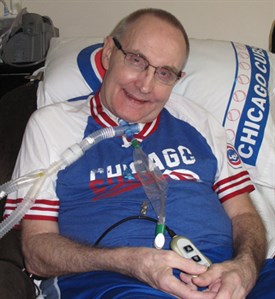Interview, David Durbin, USA
Note: second interview conducted August 8, 2013
 David Durbin (1947 – 2014) was born and raised in Rochester, New York, and in Florida. After graduating from high school in 1965, he went to work at the Eastman Kodak Co. He had just gotten engaged to be married when he received his draft notice from the United States Army in 1966. Durbin served as a Military Policeman (MP) in Vietnam. He received the Purple Heart for being wounded during the Tet Offensive in January 1968 and was honorably discharged the following October. After his service, Durbin returned home to Rochester and resumed his job at Kodak. He later worked for IBM and ultimately ended up retiring from Wegmans Food Markets in 2009. Durbin was diagnosed with ALS in 2011. He passed away on October 30, 2014.
David Durbin (1947 – 2014) was born and raised in Rochester, New York, and in Florida. After graduating from high school in 1965, he went to work at the Eastman Kodak Co. He had just gotten engaged to be married when he received his draft notice from the United States Army in 1966. Durbin served as a Military Policeman (MP) in Vietnam. He received the Purple Heart for being wounded during the Tet Offensive in January 1968 and was honorably discharged the following October. After his service, Durbin returned home to Rochester and resumed his job at Kodak. He later worked for IBM and ultimately ended up retiring from Wegmans Food Markets in 2009. Durbin was diagnosed with ALS in 2011. He passed away on October 30, 2014.
In his interview, Durbin discusses his basic training at Fort Benning, Georgia, and his advanced training for MP duty in Fort Gordon, Georgia. Durbin was stationed in Saigon, where he reported to General Westmoreland. His primary responsibilities were to guard the hotel that served as headquarters for the American military and to police the surrounding area, making sure his fellow servicemen were safe and that they conducted themselves appropriately. Durbin covers a wide range of topics, including his daily work, leisure activities, interactions with Vietnamese civilians and soldiers, and policing American GIs in the bars and brothels around the city. He shares his personal experiences of historic moments in the war, like when he heard the point-blank execution of a North Vietnamese man by the South Vietnamese Chief of Police, an event captured in a now-iconic photograph by Eddie Adams. Durbin was also involved in the Tet Offensive attack on Saigon. He sustained extensive and lifelong injuries, for which he was decorated with the military’s Purple Heart medal. Durbin discusses the psychological effects of his wartime experiences and how he suffered from post-traumatic stress disorder (PTSD) after coming home, putting a lot of strain on his relationship with his family. He also talks about how his military service caused him to develop ALS, a progressive neurodegenerative disease that left him completely disabled in the last few years of his life. Durbin shares several photographs with his interviewer and describes them in his interview.
